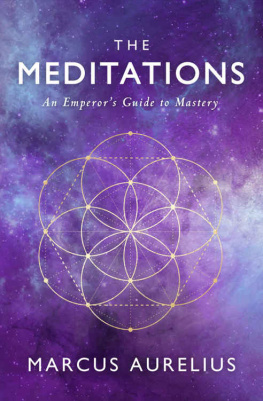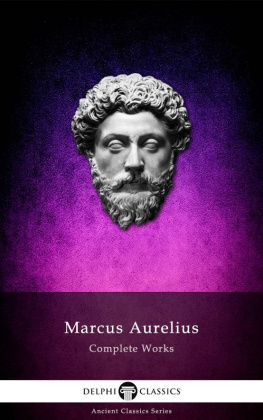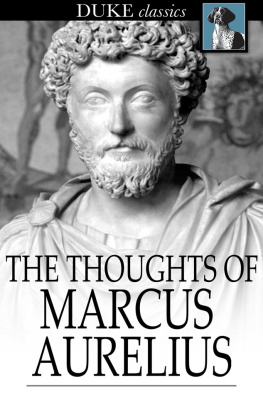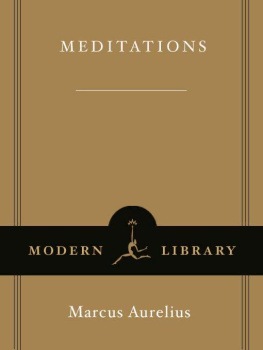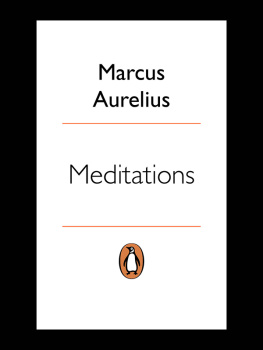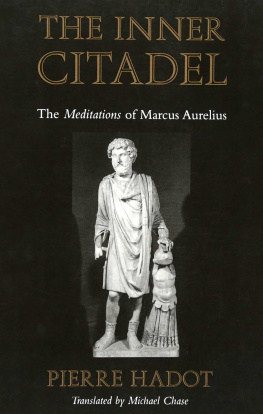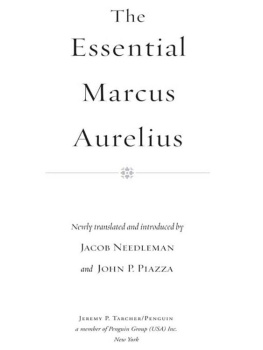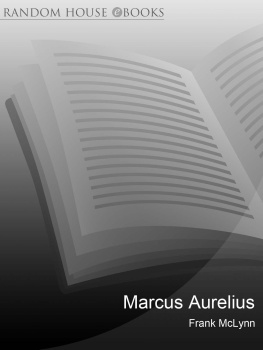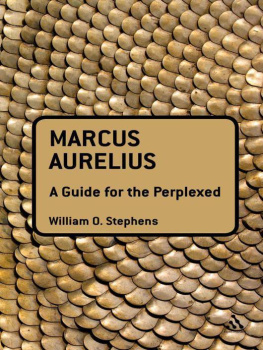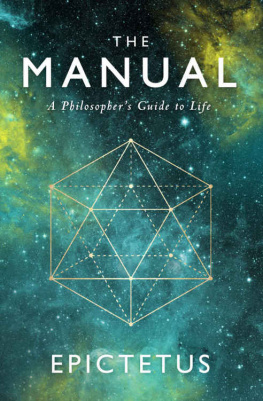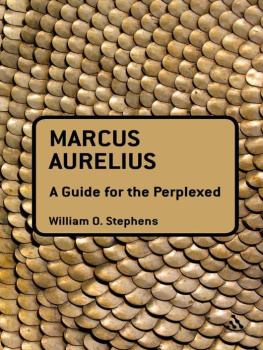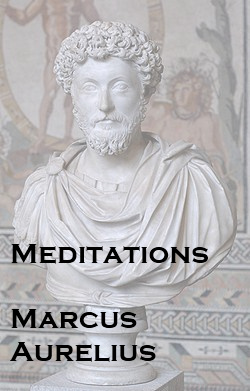The
MEDITATIONS
An Emperors Guide to Mastery
MARCUS AURELIUS

Ancient Renewal
[ see all our titles here ]
A new paraphrase rendering by Sam Torode;
loosely based on a translation by
George Long (18001879).
Text and design copyright 2017 Sam Torode.
This is a Companion to:
The Manual: A Philosophers Guide to Life
by Epictetus
Related Books:
Tao Te Ching by Lao Tzu
Nature by Ralph Waldo Emerson
Everyday Emerson by Ralph Waldo Emerson
The Song of Songs

FOREWORD
In the Fall of 2008, as the world plunged into the worst economic crisis since the Great Depression, I experienced my own collapsea marital separation, leading to divorce.
Enduring each day became a struggle. My inner landscape (my mind) was now a war zone. Daydreamingpreviously my refugebecame dangerous. My imagination could only conjure despair.
I desperately needed peace of mind.
For the first time in my life, I ventured into the Self-Help section of the bookstore, and skimmed my way through nearly every title. Things Id always scoffed atlike positive thinking, affirmations, and visualizationwere now of vital interest. Even the cheesiest volumes usually had something of value to take away. For instance, from Rhonda Byrnes The Power (a sequel to The Secret a book Id often mocked), I copied down this sentence: Every challenge is presented to you so that you will choose love and turn away from negativity and blame.
I also combed the nearby Philosophy aisle, whereto my surpriseI discovered two ancient books that proved to be the most helpful of all: the Manual of Epictetus and the Meditations of Marcus Aurelius.
Epictetus and Marcus Aurelius are pillars of the Stoic school of philosophy. Stoicism doesnt mean repressing emotion and shunning pleasure, I learned, butin essencefocusing on what is in our power and letting go of everything we cant control.
Stoic philosophy, I found, is at the foundation of the best modern self-help approaches, such as rational emotive therapy, cognitive behavioral therapy, and positive psychology. (Its influence is even reflected in the Rhonda Byrne quote above).
Your experience of life is determined by how you look at it, Marcus said.
To change your experience, change your opinion. If youre upset by something outside you, its not the thing itself that upsets you, but your opinion of it. And its in your power to wipe away that opinion immediately.
Epictetus and Marcus Aurelius offered practical help, here and now. They showed that by changing my thoughts about a situation, I could let go of pain.
The way to peace of mind, Epictetus and Marcus Aurelius taught, was in tending the garden of my own mind (by nurturing the positive and weeding out the negative) and disregarding other peoples opinions of and actions towards me.
Retreat into your inner sanctuary, Marcus directed.
Here, away from strain and distraction, you are free to observe the world and your reactions objectively. Nothing touches the soul; it cannot be harmed by anything external.... What truly hurts you is what makes you a worse person. Dont say youve been harmed if your reason and character are untouched. And no one can muddy your reason and mar your character but yourself.
Other books that I found particularly soothing at this time were the Tao Te Ching and Ralph Waldo Emersons Nature . As a writer and book designer by trade, I decided to create my own editions of these works. I saved the Manual and Mediations for last.
Nearly ten years after first discovering the wisdom of Epictetus and Marcus Aurelius, I made it part of my daily morning routine to study a passage from an old translation of their words and re-write it in simple, contemporary language.
While my rendering of the Manual sticks very close to the original, I took greater liberties with the Meditations . Thats because the Meditations is not a unified book, but a series of private journal entries written down over the course of years in twelve separate folios. Naturally, some entries are more relevant to us than others, and Marcus often repeats the exact same idea in only slightly different words; so I edited out repetitive passages and honed in on the essential concepts.
If you are searching for peace of mind, I hope you benefit from the Manual and Meditations as much as I have.
Sam Torode
I welcome your comments about this book at sam.torode@gmail.com.
To keep up with future releases, follow me on Amazon and/or Facebook:
www.amazon.com/author/samtorode
www.facebook.com/SamTorodeBooks

BOOK 1
Im grateful to all my teachers and exemplars:
My grandfather (Marcus Annius Verus II) modeled good morals and an even temper.
My father (Marcus Annius Verus III), though his reputation and my memories of him (he died when I was three), exemplified humility and manliness.
My mother (Domitia Lucilla) demonstrated reverence, service to others, and simple living, far from the habits of the rich. She was pure not only in her actions but in her thoughts.
My great-grandfather (Catilius Severus) instilled in me the value of education, and that its worth the expense to hire at-home tutors for your children.
My first tutor taught me not to pick favorites at the Circus games or the gladiatorial fights. He also taught me the value of hard work, using my hands, and minding my own business.
Diognetus taught me not to busy myself on trifles, not to breed birds for fighting, and not to give credence to supposed seers and miracle-workers about prophecies, incantations, the driving away of demons, and such. Most importantly, he introduced me to philosophy, taking me to hear Bacchius, Tandasis, and Marcianus. Because of their influence I began writing philosophical dialogues, wore a coarse robe, and slept on a plank bed, following the Greek discipline.
Rusticus showed me that my character needed discipline and development. He taught me not to be led astray by sophists or by speculative, esoteric philosophies. Not to show off, whether in flowery orations, feats of asceticism, or public acts of charity. To speak and write simply, without rhetorical flourish, following the example of his letters. To react calmly when wronged or offended; not to hold grudges; to reconcile with others as soon as they show willingness. To read books deeply, not superficially. He loaned me books from his own collection, and introduced me to the teachings of Epictetus.
Apollonius extolled the freedom of the will and an undeviating steadiness of purpose. He taught me to depend on reason above all else, and to be the same person in hard times as in good, in sickness as in health. He demonstrated that a person can be both resolute and flexible, learned and humble.
Sextus exemplified the spirit of generosity. He led his family as a true father. He cared for his friends, tolerated the ignorant, and conversed with everyone on their level. He was agreeable without flattering; affectionate, but free from the extremes of passion. I never saw him angry. He had a rare ability to discover and organize the principles of life, and possessed great learning and wisdom yet never made a show of it.
My grammar teacher, Alexander, showed how to correct without criticizing. Instead of interrupting others to point out their mistakes, he would gently introduce the proper way of speaking in his reply.
Fronto taught me to recognize tyrants by their duplicity, hypocrisy, and envy. Those called Patricians, he said, all too often are lacking in paternal affection.
Next page
